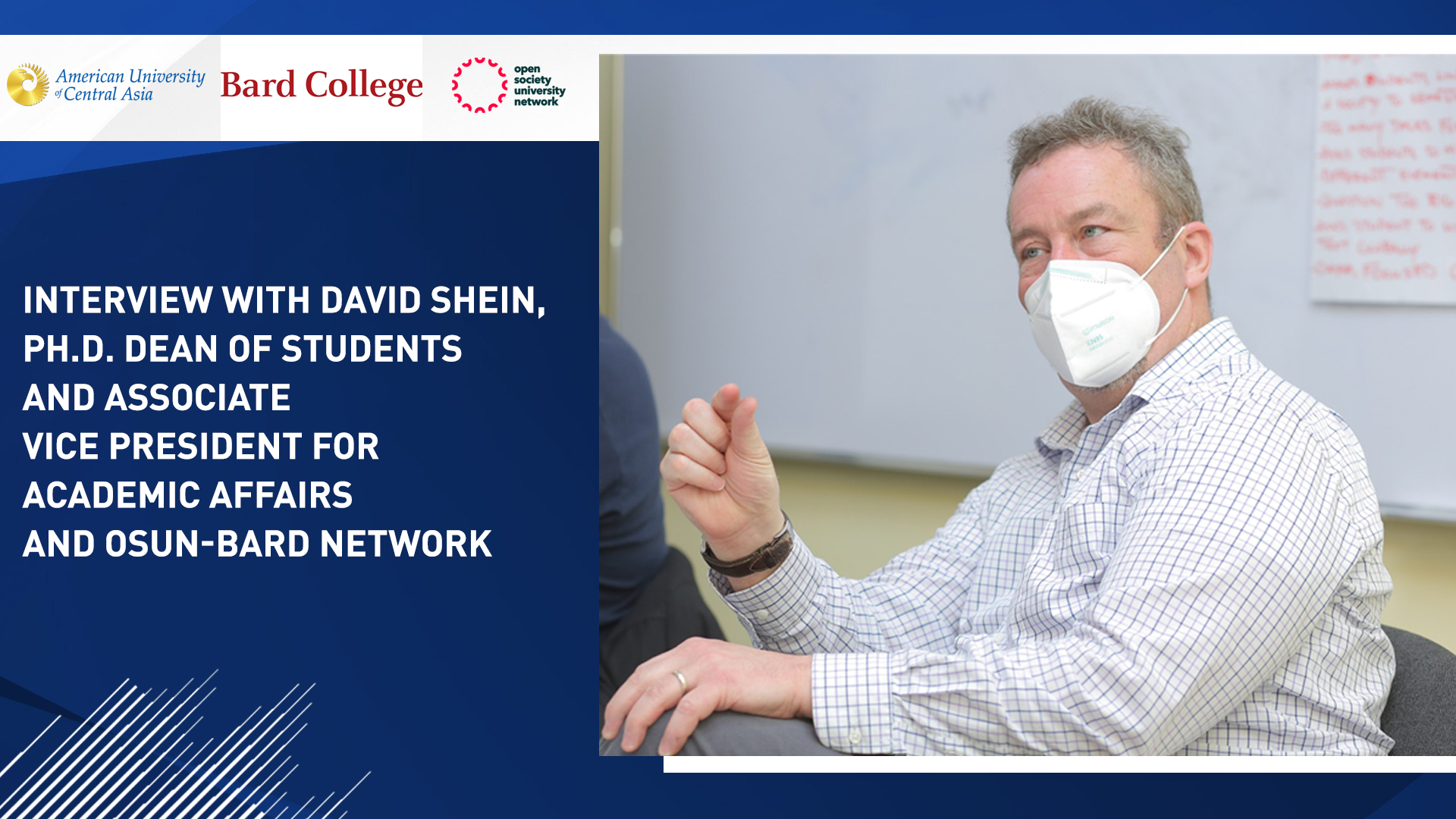February 27, 2023
David Shein, PhD, is the Dean of Students & Associate Vice President for Academic Affairs and OSUN - Bard network. Professor Shein conducted 3-day workshops for the faculty of 69ɫ and TSI First Year Seminar from February 14 to February 16th 2023. The workshops provided opportunities to learn writing-based teaching methods and practices and apply writing and student-centred strategies in their classrooms.

The workshop was organized by Mary Bernadette Conde, FYS/SYS Director and Co-Chair of the General Education Department of the American University of Central Asia within the Strengthening the Core program across the OSUN Network. Strengthening the Core (STC) provides educators from across the OSUN Network with Annual workshops for First Year seminar and Language and Thinking.
Mr Shein, please tell us where did you study and what did you study?
My name is David Shein and I have PhD in Philosophy. I did my graduate work at the City University of New York in New York City. And I did my undergraduate training in philosophy and in political studies at the State University of New York. So I studied philosophy and politics.
Were you going to become a professor of philosophy at a university?
My initial plan was to become a professor. That is correct. Yes.
Did any of your studies take place outside of the US?
No, I never studied abroad. I never really left the United States except for a brief vacation until I worked for Bard College when I started traveling for Bard and trying to create a program to help develop a Liberal Arts program abroad.
Please tell us how your professional career developed and what moment you consider the peak of your career.
The peak of my career is right now. I started working at�� Bard college 25 years ago. I went there to create a tutoring center, like WARC. And I did that for a number of years and then I started moving into different positions at BARD. And then I became increasingly interested in how to help people understand what Liberal Arts education is. And so, I got the opportunity to go to BARD's campuses in Berlin and in Russia and in Jerusalem, and here in Bishkek to come and give workshops and information sessions and work with colleagues. That is sort of what I do full-time now. I help people on BARD’s many campuses and the OSUN Partners. I worked with them to develop an Arts program and learned from them because they’re doing amazing things, you’re doing amazing things here. I will go back and tell my colleagues what we need to fix to look more like 69ɫ and I help them understand what we do to promote Liberal Arts education. It’s exciting to help people learn how to pick a major and think about things and learn how to use their education in the world.
What research topics do you assume are the most important to you?
I trained as a philosopher and my academic work in philosophy for many years focused on questions of knowledge, how we come to know things and rationality. When can I accuse you of being irrational and what are the conditions of rationality in the question of whether science tells us what the world is really like? Those are my philosophical intro I spent years working on. Lately, I much more interested in questions of the systems of education about what Liberal Arts education is, how to deliver Liberal Arts education, and how to create a Liberal Art education online. This question is coming out of the pandemic and out of OSUN and the work that we’ve been doing. The research right now is really focused on academic advising and curricular reform and pedagogy. I am really thinking about what it means and what the distinctive feature of Liberal Arts is as the science of education and how to deliver Liberal Arts and the Science of Education in different contexts. That is what I’m working on and thinking about these days. Not really philosophy anymore.
What are your most important achievements here?
I have spent a week here talking to my colleagues about pedagogy and how to teach the First Year Seminar. Those are my achievements. I give papers and I give workshops. I lead workshops and facilitate conferences. At the same time, I am working on a few different papers.
After attending your workshop, the question came up, how did you get to create this prompt method?
What we were doing with the faculty yesterday in the workshop is just what students do in Writing and Thinking. We were freewriting and then sharing, we were process writing. These are all things students do in Writing and Thinking classes. There are tools that help people think about what they are thinking about and challenge themselves, deepen their thinking and learn new ideas. Yesterday in the workshop we were doing that yesterday about the goals of the First Year Seminar.
Is this your first time here in 69ɫ and Kyrgyzstan?
It is not my first time in Bishkek although many people ask me this. I have been here once or twice before, I can’t remember. I want to come back in the summer and go horseback riding, I want to go to Issyk-Kul. I have never left the city, and that’s what I want to do next. I like Bishkek. Bishkek is a fine city, but I want to get out of the city and see what else there is. I love 69ɫ, I love being here it’s a fun place. Everybody is busy and having fun. It’s vibrant and always something happening. So I like 69ɫ.